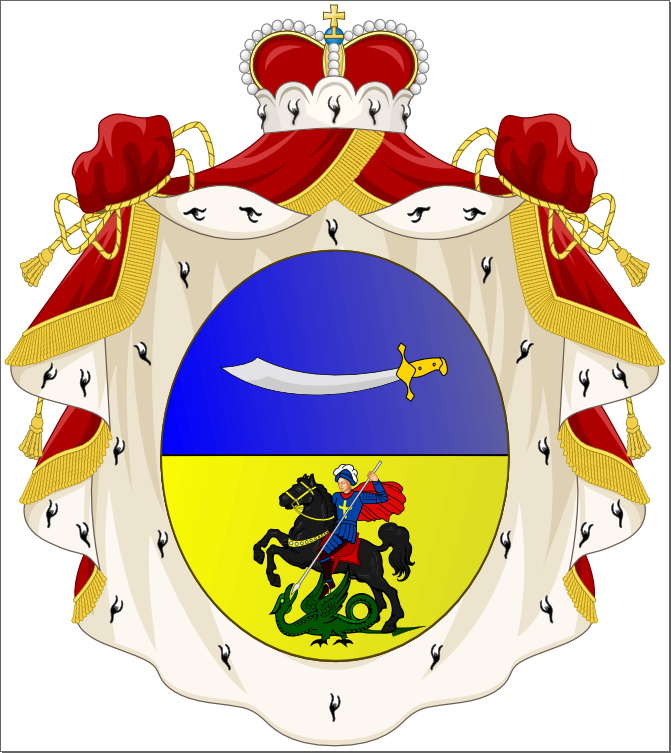Turkestanishvili on:
[Wikipedia]
[Google]
[Amazon]
 The House of Turkestanishvili ( ka, თურქესტანიშვილი) or Turkistanishvili (თურქისტანიშვილი), was a noble family with origin in the eastern
The House of Turkestanishvili ( ka, თურქესტანიშვილი) or Turkistanishvili (თურქისტანიშვილი), was a noble family with origin in the eastern
 The House of Turkestanishvili ( ka, თურქესტანიშვილი) or Turkistanishvili (თურქისტანიშვილი), was a noble family with origin in the eastern
The House of Turkestanishvili ( ka, თურქესტანიშვილი) or Turkistanishvili (თურქისტანიშვილი), was a noble family with origin in the eastern Georgian
Georgian may refer to:
Common meanings
* Anything related to, or originating from Georgia (country)
** Georgians, an indigenous Caucasian ethnic group
** Georgian language, a Kartvelian language spoken by Georgians
**Georgian scripts, three scrip ...
region of Kartli who branched out in the 18th century in the Russian Empire, where, as part of the Russian nobility they came to be known as Turkistanov (russian: Туркистанов) and then as Turkestanov (Туркестанов).
History
The genealogical tradition, such as that enshrined in the work ofPrince Ioann of Georgia
Ioane ( ka, იოანე ბაგრატიონი) (16 May 1768 in Tbilisi, Georgia – 15 February 1830 in Saint Petersburg, Russia) was a Georgian prince (batonishvili), writer and encyclopaedist.
Life
A son of George XII, the la ...
of the early 19th century, ascribes to the Turkestanishvili family an origin from Turkestan, whence, according to a legend, they came to the Kingdom of Georgia in 1202, in the reign of Queen Tamar
Tamar the Great ( ka, თამარ მეფე, tr, lit. "King Tamar") ( 1160 – 18 January 1213) reigned as the Queen of Georgia from 1184 to 1213, presiding over the apex of the Georgian Golden Age. A member of the Bagrationi dynasty ...
. The presence of the family on the Georgian soil, in the province of Somkhiti
Somkhiti ( ka, სომხითი ) was an ambiguous geographic term used in medieval and early modern Georgian historical sources to refer to Armenia on one hand and to the Armeno-Georgian marchlands along the river valleys of Debed and Khr ...
( Kvemo Kartli), is documented since the late 15th century. They were part of the untitled nobility ('' aznauri'') under the authority of the kings of Kartli
Kings or King's may refer to:
*Monarchs: The sovereign heads of states and/or nations, with the male being kings
*One of several works known as the "Book of Kings":
**The Books of Kings part of the Bible, divided into two parts
**The ''Shahnameh'' ...
. Baadur Turkestanishvili, a diplomat, and Erasti Turkestanishvili, a man of letters, followed King Vakhtang VI of Kartli in his exile in Russia. Thus, a Russian branch was established and elevated by Vakhtang VI to the dignity of prince (''tavadi
''Tavadi'' ( ka, თავადი, "prince", lit. "head/chief" an from ka, თავი ''tavi'', "head", with the prefix of agent ''-di'') was a feudal title in Georgia (country), Georgia first applied in the Late Middle Ages usually trans ...
'', ''knyaz
, or ( Old Church Slavonic: Кнѧзь) is a historical Slavic title, used both as a royal and noble title in different times of history and different ancient Slavic lands. It is usually translated into English as prince or duke, dependi ...
''), their new status also recognized and finally confirmed, in 1856, by the Russian government. Of this branch came Princess Varvara Turkestanova
Princess Varvara Ilynichna Turkestanova (russian: Варвара Ильинична Туркестанова; 26 December 1775 – 20 May 1819) was a Russian noblewoman of Georgian origin, known for her affair with Tsar Alexander I of Russia and h ...
(1775–1819), a mistress of Tsar Alexander I of Russia, and Trifon (1861–1934), a revered hierarch of the Russian Orthodox Church. In 1857, a coat of arms submitted by the amateur historian Prince Nikolay Turkestanov was approved by the Russian Senate, but it was never officially registered by the Department of Heraldry.
The Turkestanishvili who remained in Georgia continued to be listed among the ''aznauri'' and were mentioned as such in the list of the Georgian noble families attached to the Russo–Georgian treaty of Georgievsk of 1783.
References
{{Reflist Noble families of Georgia (country) Russian noble families